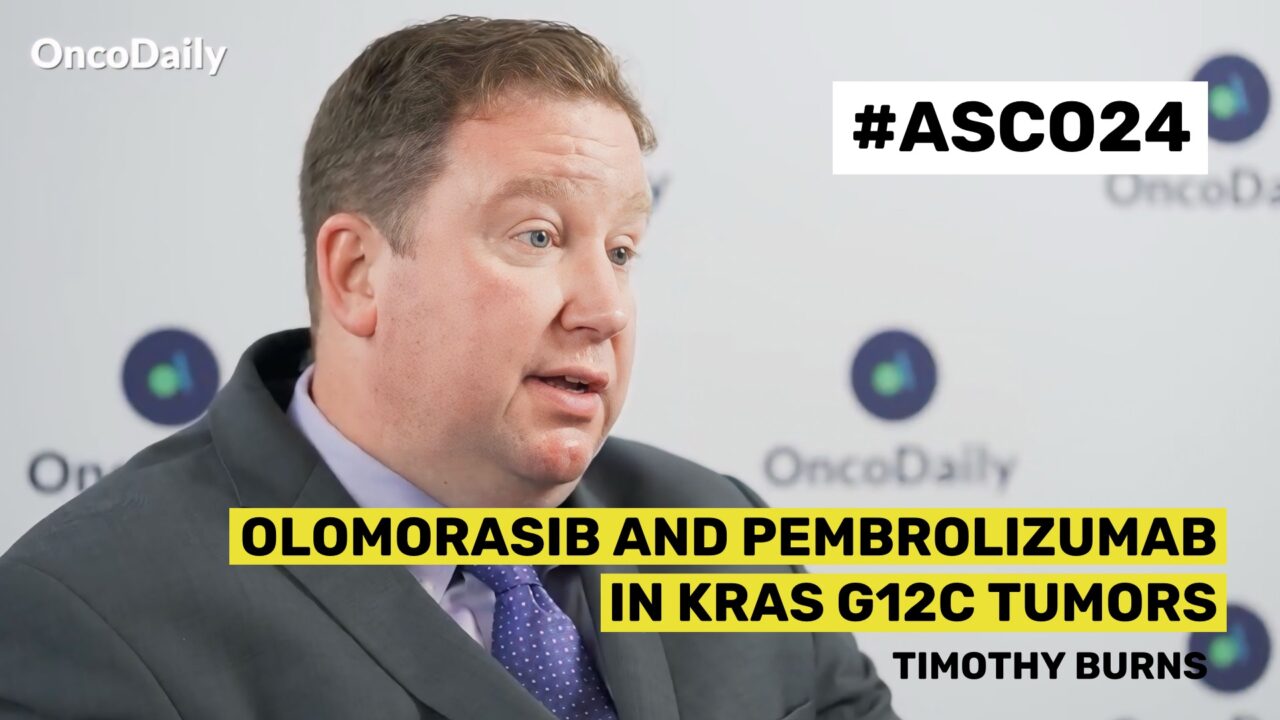The American Society of Clinical Oncology (ASCO) Annual Meeting is one of the largest and most prestigious conferences in the field of oncology. This year, the meeting took place from May 31 to June 4 in Chicago, Illinois. The event gathers oncologists, researchers, and healthcare professionals from around the world to discuss the latest advancements in cancer research, treatment, and patient care. Keynote sessions, research presentations, and panel discussions are typically part of the agenda, providing attendees with valuable insights into emerging trends and innovations in oncology.
This year, OncoDaily was at ASCO 2024 for the first time covering the meeting on-site. We had the pleasure of interviewing researchers who summarized the highlights of their work.
In this video, Dr. Timothy Burns, shared insights on ‘Efficacy and safety of olomorasib (LY3537982), a second-generation KRAS G12C inhibitor (G12Ci), in combination with pembrolizumab in patients with KRAS G12C-mutant advanced NSCLC.‘
Hi, I’m Dr. Timothy Burns, an Associate Professor of Medicine at the UPMC Hillman Cancer Center and University of Pittsburgh, and today I’d like to talk to you about my recent presentation on the results from a Phase I-II study of olomorasib and KRAS-G12C mutant tumors. My presentation focused on the question of whether we could combine omoraciv, which is a second-generation, highly potent KRAS-G12C inhibitor with the anti-PD-1 agent pembrolizumab. Previous studies in lung cancer have tried to combine targeted therapy with immunotherapy.
Unfortunately, these have not been successful due to toxicity. In addition, in the KRAS-G12C space, people have also tried to combine with some of the first-generation inhibitors, and at least the data that’s been presented, it’s unlikely that these will be able to go forward due to toxicity, namely liver function abnormalities. So in this, as part of this Phase I-II trial, we tested two cohorts of patients with pembrolizumab plus omoraciv.
We tested a first-line cohort, as well as a cohort that had previously received chemo and immunotherapy, so 82% of those patients, as well as 40% had received previous KRAS-G12C inhibitors. And what we found is, in the first-line setting, we found a 77% response rate with this combination. In the second-line setting, or in the previously treated setting, we found a response rate of 40%, and in each case, we found a disease control rate well over 80%.
And again, in the second-line setting, these are patients that have previously received chemotherapy, immunotherapy, and prior KRAS-G12C. We saw responses, regardless of PD-L1 expression. Two doses were tested, and both doses seemed to be effective.
And so the second part is, it does seem to be effective, and this is promising. We had an estimated 12-month PFS of 72.8% in the first-line setting, but was it safe? And so what we saw mostly in terms of treatment-related AEs was most of them resembled the monotherapy omeracid, which is generally pretty well-tolerated. There were three AEs that kind of stood out.
Diarrhea, which all grade was 20%. We did have some grade three with 13%, but these were all transient, lasting less than nine days, and were easily resolved to grade one or baseline, either with antidiarrheals or a dose modification. Importantly, no one had to stop both their omeracid and pembrolizumab for the liver toxicity, which I’ll talk about in a second.
And only 3% of patients had to discontinue omeracid and 11% pembrolizumab. But I think what’s really important is, what about the liver enzymes? So we saw overall ALT and ASD about 20% and 16% all grades. We had 8% ALT, 6% AST, but importantly, these were transient.
The elevation of grade three lasted less than a week. They were easily resolved either with a dose hold or corticosteroids. No one had to stop their therapy because of LFT abnormalities, and they were not high risk.
So they were not 10 times upper limit of normal. No one was symptomatic. There was no total belly elevation.
And so really, the conclusion is, is this is a safe and tolerable, safe and tolerable regimen. So in summary, we showed that omeracid and pembrolizumab, either in the first line setting or patients that have been treated prior, even with both pembrolizumab and KRESG-12C inhibitors could respond at quite high levels. And these promising findings have led to a phase three trial testing this question in the first line setting called Sunray-01.
This will test both in the greater than 50% population, pembrolizumab plus omeracid, and in the all-comer PD-L1 population, whether the combination of Keynote-189 plus omeracid will prove survival over Keynote-189 alone.
More videos and content from ASCO 2024 on OncoDaily.


